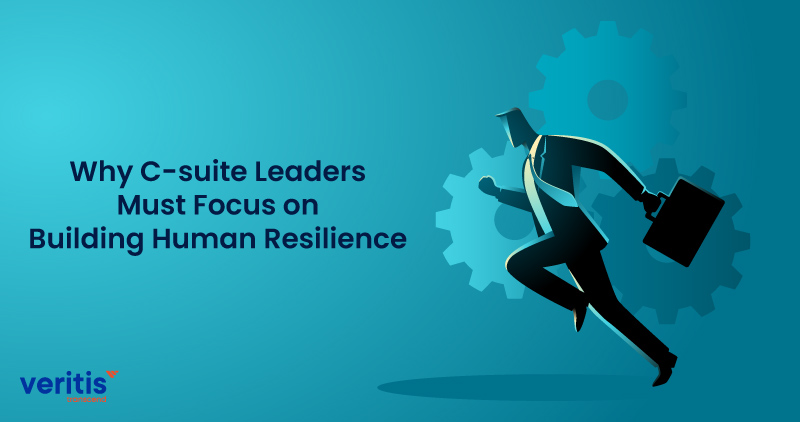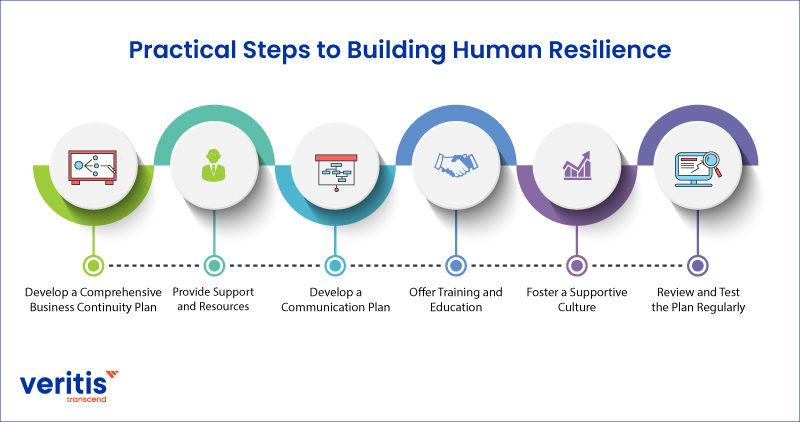
In today’s fast-paced business environment, unexpected events can occur anytime, posing significant organizational challenges. These events, such as natural disasters, cyber-attacks, pandemics, or social unrest, can significantly impact businesses, disrupting operations and causing financial losses. Therefore, organizations must have a robust business continuity plan to ensure that they can continue operating in the face of disruption.
A business continuity plan is a comprehensive management system designed to ensure an organization can function during and after a crisis. C-suite leaders are critical in building human resilience within their organizations, enabling employees to cope with unexpected events and safeguarding the organization’s long-term survival. This article will explore how C-suite leaders can build human resilience within their organizations through effective business continuity planning.
Business continuity management is a crucial aspect of modern businesses. It refers to the ability of an organization to maintain its essential functions and processes during unforeseen circumstances. Business continuity planning (BCP) is developing strategies and plans to ensure an organization can continue functioning in a crisis. C-suite leaders play a critical role in business continuity planning by providing the necessary resources and support to mitigate risks and build resilience.
Business continuity planning is about more than just technology and infrastructure. C-suite leaders must also focus on building human resilience to ensure employees can cope with the impact of disruptive events. In this blog post, let’s explore the importance of building human resilience in business continuity planning and provide practical steps that C-suite leaders can take to ensure their employees are prepared for any unexpected event.
Why C-suite Leaders Must Focus on Building Human Resilience

Business continuity risks can take many forms, and the impact can positively impact an organization. In the face of such events, employees may feel stressed, anxious, and uncertain. This can harm their ability to work effectively, leading to decreased productivity, lower morale, and increased turnover. C-suite leaders must recognize the importance of human resilience in the face of such events.
Building human resilience involves equipping employees with the tools and resources to cope with unexpected situations, manage stress, and maintain their mental and physical health. Resilient employees can better adapt to change and help the company weather any storm. By building resilience, C-suite leaders can ensure that their employees are better prepared to cope with unexpected events and can continue to perform their roles effectively.
Let’s dive into the advantages and disadvantages of business continuity
Advantages:
- Reduces the Impact of Unexpected Events: By having a robust business continuity plan, organizations can minimize the impact of unexpected events on their operations, finances, and reputation. The plan outlines strategies to mitigate risks and provides a framework for responding to crises, ensuring that the organization can continue operating despite disruption.
- Increases employee morale and engagement: Building human resilience within an organization can help to increase employee morale and engagement. Employees who feel supported and equipped to cope with unexpected events are more likely to be satisfied with their jobs and committed to the organization’s success.
- Enhances Organizational Reputation: Organizations that are well-prepared for unexpected events are viewed as more reliable and trustworthy by stakeholders. This can enhance the organization’s reputation and make it more attractive to customers, investors, and employees.
- Provides a Competitive Advantage: Organizations with a robust business continuity plan are better positioned to compete in their industry. They are more resilient and able to adapt to change, making them more likely to succeed in the long term.
Useful link: How C-Suite Executives Look at DevOps?
Disadvantages:
- Can be Costly: Developing and implementing a comprehensive business continuity plan can be expensive, especially for small or medium-sized organizations with limited resources.
- Can be Time-consuming: Building human resilience within an organization requires time and effort from employees and C-suite leaders. This can be a significant investment of time and resources, taking away from other critical business functions.
- May Create Complacency: If employees become too reliant on the business continuity plan, they may become complacent and less responsive to unexpected events. This can undermine the plan’s effectiveness and increase the organization’s vulnerability to disruption.
- May not Cover All Risks: No business continuity plan can cover every possible risk that an organization may face. The plan may not account for unexpected events or challenges, leaving the organization vulnerable to disruption.
Practical Steps to Building Human Resilience

Develop a Comprehensive Business Continuity Plan
The first step in building human resilience is to develop a comprehensive business continuity plan. This plan should identify potential risks and threats to the organization and outline strategies and plans to mitigate those risks. It should also include provisions for employee safety and well-being during and after a crisis. C-suite leaders should involve employees in developing the plan to ensure it is comprehensive and practical.
Business continuity planning and building human resilience within organizations have several advantages and disadvantages. C-suite leaders must carefully consider these factors when developing and implementing their business continuity plans to ensure they are effective and appropriate for their organization’s needs.
Provide Support and Resources
C-suite leaders must recognize that employees may need additional support during a crisis. This may include access to counseling services, financial assistance, and flexible work arrangements. Employees can feel more secure and supported during challenging times by providing these resources. In addition, C-suite leaders should ensure that employees have access to the necessary tools and equipment to continue to perform their roles remotely if required.
Develop a Communication Plan
Communication is vital during any crisis. C-suite leaders must develop a communication plan that ensures employees are updated with the latest information. This may include regular updates via email, social media, or the company intranet. Ensuring that employees have access to accurate and timely information is essential to help alleviate any anxiety or uncertainty. C-suite leaders should also ensure employees know the organization’s plans and procedures for dealing with a crisis.
Offer Training and Education
Training and education can help employees build the skills and knowledge they need to cope with unexpected events. This may include emergency procedures, first aid, and mental health awareness training. By providing employees with the tools they need to manage stress and maintain their well-being, C-suite leaders can help build resilience in their workforce. In addition, regular training and education can help employees feel more confident and prepared to deal with unexpected events.
Foster a Supportive Culture
C-suite leaders must foster a supportive culture that encourages open communication and collaboration. Employees should feel comfortable discussing their concerns and asking for help when needed. C-suite leaders should also be approachable and responsive to employee needs, providing a supportive environment that promotes well-being and mental health.
Review and Test the Plan Regularly
Finally, C-suite leaders should regularly review and execute their business continuity program to ensure it remains practical and current. This may involve simulations of various crisis scenarios to test the organization’s response and identify areas for improvement. Regular testing and review can ensure that employees are prepared for any unexpected event and that the organization can continue functioning in the face of disruption.
Useful link: Why Data Driven Culture is Important for You
Conclusion
Business continuity planning is essential for any modern organization. C-suite leaders are critical in ensuring their organization is prepared for unexpected events. Building human resilience is a crucial aspect of business continuity planning. C-suite leaders must recognize the importance of equipping employees with the necessary tools and resources to cope with disruption. By developing a comprehensive business continuity plan, providing support and resources, developing a communication plan, offering training and education, fostering a supportive culture, and regularly reviewing and testing the plan, C-suite leaders can help build a resilient workforce that can help their organization weather any storm. But this planning and execution need empathy at its heart.
With empathy as one of its tenets, Veritis has chalked out business continuity plans that have allowed companies to continue their business operations in the face of the pandemic. Whether a Fortune 500 or emerging firm, we pulled out all the stops to ensure business continuity. We have gone on to win the Stevie Award for our contributions to DevOps and made our presence felt in the IT arena. Based out of Texas, we have catered to clients from various corners of the globe. So, reach out to us, and we shall bring out a business continuity plan that has empathy and builds human resilience.
Got Questions? Schedule A Call
Also Read:
- 4 Core Principles For A ‘Perfect Business Continuity Plan’
- COVID-19 Crisis: How to Drive Effective ‘Business Continuity’?
- Steps to Preserve Business Continuity and Enterprise Resilience
- Business Continuity: Steps To ‘Restart’ Your Stalled Operations!
- 7 Key Containerization Benefits for Your IT Business
- 9 Data Security Best Practices for Your Business